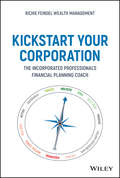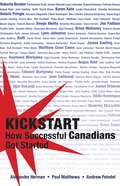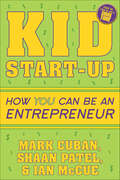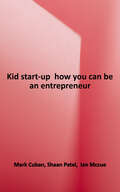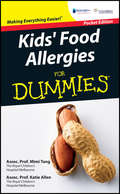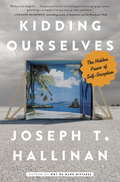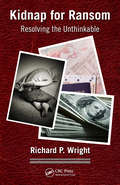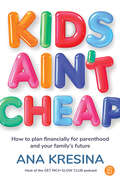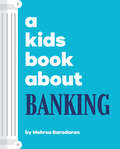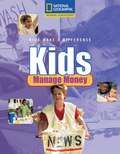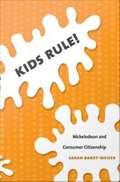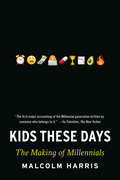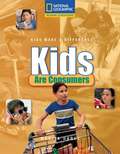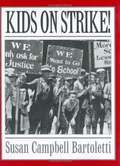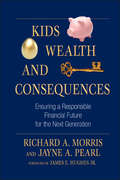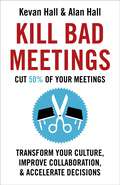- Table View
- List View
Kickstart Your Corporation: The Incorporated Professional's Financial Planning Coach
by Andrew FeindelA detailed look at financial planning strategies surrounding professional corporations for doctors, dentists, lawyers, business owners and other Canadian professionals. If you're a doctor, a dentist, a lawyer, or a business owner—virtually any type of professional in Canada—you strongly need to consider how incorporating fits into your financial plan. A good financial planner should acknowledge they have absolutely no control of the markets. However, taxes are completely controllable, and having a corporation is a powerful tool that allows professionals to control their tax bill. Using a mix of personal observations, real-life examples, and strategy evaluations, this book guides the professional along their path to using their corporation in the most efficient way. Kickstart Your Corporation: The Incorporated Professional's Financial Planning Coach is your practical guide to controlling your tax bill and taking advantage of all that a Professional Corporation has to offer. Drawing upon decades of hands-on experience in wealth management, author Andrew Feindel provides clear and accurate advice on making the incorporation decision, setting up and investing inside your corporation, optimizing your salary and dividend compensation mix, valuing permanent insurance on your corporate balance sheet, using prudent leverage, weighing the pros and cons of active or passive investment management, using alternative strategies like a Capital Gains Strip, Individual Pension Plans and Retirement Compensation Arrangements, and much more. This must-have book: Provides Canadian professionals with an accurate and straightforward investment and financial planning guide to incorporation Covers the basics of incorporating for the professional and business owner, including a review of the process and the costs to incorporate, and the likely benefits Analyzes the best financial strategy for various situations Offers real-world advice on structuring compensation, risk management, borrowing to invest, and the role of trusts in professionals’ financial plans Written by a senior vice president at an independent leading-edge wealth management firm Kickstart Your Corporation: The Incorporated Professional's Financial Planning Coach is essential reading for any professional who has incorporated and is looking to maximize benefits, and those wanting to incorporate for the first time with expert guidance.
Kickstart: How Successful Canadians Got Started
by Alexander Herman Paul Matthews Andrew FeindelIn 2005, recent graduates Alex Herman, Paul Matthews, and Andrew Feindel realized they weren’t entirely sure where they were going in life. Then they had an idea. Over the next two years, they interviewed 70 well-known Canadians and asked them how they got started. The answers they found were not always what they expected. Kickstart profiles over 30 prominent Canadians, including professional athletes (former CFL star Norman Kwong), TV personalities (Valerie Pringle), Native leaders (Matthew Coon Come), and former prime ministers (Brian Mulroney). Their collective wisdom, offered in their own words, just might help readers "kickstart" their own lives and careers.
Kickstarting Tomato Jos in Nigeria
by Sophus A Reinert Risa KavalercikIn the spring of 2016, Mira Mehta (HBS'14), faced a difficult decision. Following a successful Kickstarter campaign, and winning the second place in the HBS New Venture Competition-Social Enterprise Track, she had moved to Northern Nigeria, where she founded the tomato paste company Tomato Jos. Though her brand had gained traction, however, she had, in the face of endless foreseen and unforeseen obstacles, yet to produce any actual paste. As the Nigerian government pondered new tariffs to protect local alternatives against the competition of ostensibly cheap and low-quality "killer tomato paste," Mehta considered a job offer from a major agricultural company that would secure her financially, but at the cost of her independence, and, perhaps, of her dreams.
Kid Start-Up: How YOU Can Become an Entrepreneur
by Mark Cuban Shaan Patel Ian McCue"The best way to predict the future is to invent it." —Mark Cuban, How to Win at the Sport of BusinessDiscover a winning idea, launch your business, and start making money today! Do you think it would be cool to run your own business? Do you want to help people with everyday problems? Do you want to make money?Then you could be an entrepreneur! You don't have to be a grownup to launch your start-up. We'll show you how to discover a great business idea and get it off the ground. You can try one of our ten kid-friendly businesses, including timeless ventures like starting a lemonade stand to more modern-day endeavors like launching an Etsy art store, or create your own. Because every billionaire was once a kid with great ideas—just like you!
Kid Start-Up: How You Can Become an Entrepreneur (G - Reference, information And Interdisciplinary Subjects Ser.)
by Mark Cuban Shaan Patel Ian McCueA ready resource for business-savvy youngsters. – Booklist "The best way to predict the future is to invent it." --Mark Cuban, How to Win at the Sport of Business Discover a winning idea, launch your business, and start making money today! Do you think it would be cool to run your own business? Do you want to help people with everyday problems? Do you want to make money? Then you could be an entrepreneur! You don't have to be a grownup to launch your start-up. We'll show you how to discover a great business idea and get it off the ground. You can try one of our ten kid-friendly businesses, including timeless ventures like starting a lemonade stand to more modern-day endeavors like launching an Etsy art store, or create your own. Because every billionaire was once a kid with great ideas--just like you! "Business 101--simple, with a good measure of excitement and motivational verve." --Kirkus
Kid's Food Allergies For Dummies
by Katie Allen Mimi TangManage your child’s food allergy with confidence. More children are being diagnosed with food allergy than ever before. This guide gives you advice on what an allergy is, different types of food allergies, tips for managing allergies in day-to-day life and step-by-step directions for treating allergic reactions.
KidZania: Shaping a Strategic Service Vision for the Future
by James L. Heskett Javier Reynoso Karla CabreraCase
Kidder, Peabody & Co.: Creating Elusive Profits
by Robert L. Simons Antonio DavilaOn April 17, 1994, Kidder, Peabody & Co. announced a $350 million charge against earnings resulting from the discovery of false trading profits. That same day, the termination of Joseph Jett's employment with the company was made public. By illustrating the mechanics of bond accounting, this case describes the trading strategy that led to the creation of false profits. Failures of internal control are also discussed. The case ends by asking who was to blame.
Kidding Ourselves
by Joseph T. HallinanFrom the Pulitzer Prize-winning journalist and author of Why We Make Mistakes, an illuminating exploration of human beings' astonishing ability to deceive themselves. To one degree or another, we all misjudge reality. Our perception--of ourselves and the world around us--is much more malleable than we realize. This self-deception influences every major aspect of our personal and social life, including relationships, sex, politics, careers, and health. In Kidding Ourselves, Joseph Hallinan offers a nuts-and-bolts look at how this penchant shapes our everyday lives, from the medicines we take to the decisions we make. It shows, for instance, just how much the power of many modern medicines, particularly anti-depressants and painkillers, is largely in our heads. Placebos in modern-day life extend beyond hospitals, to fake thermostats and "elevator close" buttons that don't really work...but give the perception that they do. Kidding Ourselves brings together a variety of subjects, linking seemingly unrelated ideas in fascinating and unexpected ways. And ultimately, it shows that deceiving ourselves is not always negative or foolish. As increasing numbers of researchers are discovering, it can be incredibly useful, providing us with the resilience we need to persevere, in the boardroom, bedroom, and beyond. Provocative, accessible, and easily applicable to multiple facets of everyday life, Kidding Ourselves is an extraordinary new exploration of our mind's flexibility.
Kidnap for Ransom: Resolving the Unthinkable
by Richard P. WrightThe enormous sums paid for the release of hostages coupled with law enforcement‘s inability to stem the tide has made kidnapping for ransom a worldwide plague. The increasing rate of reported incidents from every corner of the globe suggests this plague is growing. Kidnap for Ransom: Resolving the Unthinkable removes the veil of mystery and dispels
Kids & Company in 2018
by Boris Groysberg Matthew PrebleThis case reveals to readers what has transpired at Kids & Company in the year following the decision point presented in Kids & Company: Entering the U.S. (case 418-011).
Kids & Company: Entering the U.S.
by Boris Groysberg Matthew Preble Katherine Connolly BadenIn April 2017, Victoria Sopik and Jennifer Nashmi, CEO and CFO (respectively) of Kids & Company, a Canadian childcare provider that they had co-founded in the early 2000s and developed into a nearly 100-unit enterprise, are discussing how the company should proceed with its planned U.S. expansion. Kids & Company already has five U.S. childcare centers in and around Chicago, Illinois, and one under construction in Boston, Massachusetts, but before going any further, the two leaders plan to discuss what they have learned so far from their U.S. experience, and how that should inform their strategic growth decisions moving forward. Unlike Canada, the U.S. already has other large, for-profit childcare providers, so Kids & Co. will have to grow in a more mature market, albeit one where Kids & Company's leaders still see substantial opportunity. Company leaders also believe that the company's "boutique" childcare centers, which maintain a strict focus on customer service and flexible childcare options, would be well-received by U.S. consumers, and help it stand out from the existing, more-standardized options. The question now is how, and how fast, to grow. Should it just replicate the exact model it has developed in Canada-which has proven somewhat challenging thus far in the few years it has operated in the U.S.-or adjust elements of its model? Should it look to acquire established providers, or possibly even franchise the brand?
Kids Ain't Cheap: How to Plan Financially for Parenthood and Your Family's Future
by Ana KresinaThere are so many delightful moments in parenthood. That toothy grin. The big wet kisses. Or even when they whisper 'I love you' in your ear for the first time. Those moments are pure magic.But kids are also exhausting. The poo explosions, the sleepless nights, the defiant toddler years. If you' re partnered, it can be a strain on your relationship.It can also be financially overwhelming. Money is one of the leading causes of stress and divorce, and it' s even more crucial for single parents or carers to be aware of as the sole breadwinner.Kids Ain' t Cheap is an easy-to-understand book that helps you prepare financially before you become a parent for the first (or second, or third) time. It shows you how to mitigate risk and reduce financial stress.From pre-pregnancy financial planning to the expensive childcare years and beyond, this book gives you the skills to run cost estimates, understand your loss of earning potential, get your finances in order, start investing for your family and set up your children for their own financial success. More than anything, it gives you the freedom to focus on what is most important to you: your family.
Kids Book About Banking, A (A Kids Book)
by Mehrsa BaradaranLearn all about banks and the magic of money.When you think of a bank, what comes to mind? A building? A safe, filled with gold? What if we told you banks weren't any of these things? And (get ready for this)...most money isn't even kept in the bank! Banking is a system that allows money to move from one place to another, creating opportunities and growth. And banks only work with a shared belief in the magic of money.
Kids Manage Money
by Ellen KellerKids share ideas on how to earn, spend, and save money. A step-by-step model shows kids how to create their own plan to raise money for a charitable cause.
Kids Rule!: Nickelodeon and Consumer Citizenship
by Sarah Banet-WeiserIn Kids Rule! Sarah Banet-Weiser examines the cable network Nickelodeon in order to rethink the relationship between children, media, citizenship, and consumerism. Nickelodeon is arguably the most commercially successful cable network ever. Broadcasting original programs such as Dora the Explorer, SpongeBob SquarePants, and Rugrats (and producing related movies, Web sites, and merchandise), Nickelodeon has worked aggressively to claim and maintain its position as the preeminent creator and distributor of television programs for America's young children, tweens, and teens. Banet-Weiser argues that a key to its success is its construction of children as citizens within a commercial context. The network's self-conscious engagement with kids--its creation of a "Nickelodeon Nation" offering choices and empowerment within a world structured by rigid adult rules--combines an appeal to kids' formidable purchasing power with assertions of their political and cultural power. Banet-Weiser draws on interviews with nearly fifty children as well as with network professionals; coverage of Nickelodeon in both trade and mass media publications; and analysis of the network's programs. She provides an overview of the media industry within which Nickelodeon emerged in the early 1980s as well as a detailed investigation of its brand-development strategies. She also explores Nickelodeon's commitment to "girl power," its ambivalent stance on multiculturalism and diversity, and its oft-remarked appeal to adult viewers. Banet-Weiser does not condemn commercial culture nor dismiss the opportunities for community and belonging it can facilitate. Rather she contends that in the contemporary media environment, the discourses of political citizenship and commercial citizenship so thoroughly inform one another that they must be analyzed in tandem. Together they play a fundamental role in structuring children's interactions with television.
Kids These Days: Human Capital and the Making of Millennials
by Malcolm HarrisNamed one of Fall 2017's most anticipated books by New York Magazine, Publishers Weekly, Nylon, and LitHubEveryone knows "what's wrong with Millennials." Glenn Beck says we've been ruined by "participation trophies." Simon Sinek says we have low self-esteem. An Australian millionaire says Millennials could all afford homes if we'd just give up avocado toast. Thanks, millionaire. This Millennial is here to prove them all wrong."The best, most comprehensive work of social and economic analysis about our benighted generation." -Tony Tulathimutte, author of Private Citizens"The kind of brilliantly simple idea that instantly clarifies an entire area of culture."-William Deresiewicz, author of Excellent Sheep Millennials have been stereotyped as lazy, entitled, narcissistic, and immature. We've gotten so used to sloppy generational analysis filled with dumb clichés about young people that we've lost sight of what really unites Millennials. Namely: - We are the most educated and hard-working generation in American history. - We poured historic and insane amounts of time and money into preparing ourselves for the 21st century labor market.- We have been taught to consider working for free (homework, internships) a privilege for our own benefit.- We are poorer, more medicated, and more precariously employed than our parents, grandparents, even our great grandparents, with less of a social safety net to boot. Kids These Days, is about why. In brilliant, crackling prose, early Wall Street occupier Malcolm Harris gets mercilessly real about our maligned birth cohort. Examining trends like runaway student debt, the rise of the intern, mass incarceration, social media, and more, Harris gives us a portrait of what it means to be young in America today that will wake you up and piss you off. Millennials were the first generation raised explicitly as investments, Harris argues, and in Kids These Days he dares us to confront and take charge of the consequences now that we are grown up.
Kids are Consumers (National Geographic Reading Expeditions)
by National Geographic Learning Staff Marita GareyKids are the targets of many marketing campaigns. This book teaches kids how to be smart comsumers, comparison shop and analyze ads they see and hear
Kids on Strike!
by Susan Campbell BartolettiDescribes the conditions and treatment that drove working children to strike, from the mill workers' strike in 1834 and the coal strikes at the turn of the century to the children who marched with Mother Jones in 1903.
Kids, Wealth, and Consequences: Ensuring a Responsible Financial Future for the Next Generation (Bloomberg #39)
by Jayne A. Pearl Richard A. MorrisLeaving children with a substantial amount of money can be a boon or a burden. High-net-worth parents need to give their children an education to navigate today’s complex world. The question becomes how to raise children with a sense of reality and balance, imparting a strong work ethic, and making them good stewards of their wealth. Kids, Wealth, and Consequences enlightens high-net-worth parents about the unique issues they need to explore. The book addresses the ”hard” financial issues, such as investing and estate planning, as well as the “soft” emotional issues relating to values, family, and communication. Morris and Pearl detail strategies and techniques to help parents raise children who appreciate and know how to manage the wealth they inherit. Richard Morris spent many years working for his family's multimillion dollar business, and learned firsthand the challenges of business ownership and family wealth. Jayne Pearl is an experienced journalist who writes about families, family businesses, and money.
Kikkoman Corp.: Consumer Focused Innovation
by Rohit Deshpande Hal HoganIn May 2003, the president and CEO of Kikkoman Corp. sat in his Tokyo office weighing various options for strengthening the company's long-term growth. Kikkoman was the world's largest producer of soy sauce, largely due to its pioneering role since the 1950s as the leading promoter of the product, particularly in non-Asian markets. But times had changed. The domestic Japanese market was saturated, competition had increased, and Kikkoman needed to think of innovative ways to increase revenue.
Kill Bad Meetings: Cut 50% of your meetings to transform your culture, improve collaboration, and accelerate decisions
by Kevan Hall Alan HallCUT 50% OF YOUR MEETINGS AND IMPROVE THE ONES THAT REMAINMeetings are essential to collaboration and decision making, but they are often irrelevant, time consuming and badly run. People spend an average of 2 days per week in meetings and 50% of it is wasted. This book will help you win back that wasted day a week by cutting out the half of face to face and virtual meetings that do not need to happen and radically improving the ones that remain.The two authors, one an experienced CEO and consultant to major multinationals, the other a millennial line manager working within one of the world's largest companies, find common ground, and occasional disagreements on creating new ways of meeting both face to face and through technology that are far more engaging and effective for everyone.The book focuses on three main areas:· Dealing with the business and corporate cultural challenges in changing the way we meet· Cutting out the unnecessary topics and participants that make up 50% of todays meetings· Designing and running faster and more focused face to face and online meetings with more relevant content; clearer decisions and actions, and much higher levels of participationFull of examples and practical tools that will improve everything from your regular team meetings to management meetings, online conferences, global meetings and big events. This book will lead you through practical actions and targets to kill the meetings that do not need to happen and radically improve the ones that remain.
